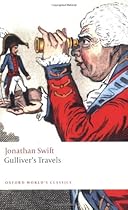 Okay, I'm just a day late this time for part three of the Gulliver's Travels read-a-long hosted by Allie at A Literary Odyssey. I'm slowly catching up, but I've been bombarded with e-mails from former co-workers and friends about my job change and have had lots of fun things to do like take a drug test and preparing for the new job. But it was quite nice to take a break a rejoin Gulliver on his travels.
Okay, I'm just a day late this time for part three of the Gulliver's Travels read-a-long hosted by Allie at A Literary Odyssey. I'm slowly catching up, but I've been bombarded with e-mails from former co-workers and friends about my job change and have had lots of fun things to do like take a drug test and preparing for the new job. But it was quite nice to take a break a rejoin Gulliver on his travels. A lot of critics talk about about how part three doesn't fit with the rest of the book and is sort of seen as a problem section. It is different from the others, but I love this part. All of the other three sections focus on a specific group of people. In part three, Gulliver travels to several different places and meets a variety of different people groups. I remember being enthralled with this section the first time I read because I had no idea what would happen next. I also feel like some of the things in this chapter are really creative. Flying islands, people trying to turn excrement into food (again with the crudeness!), immortals, visits to the dead, there's a little something for everyone.
Everything about the island of Laputa vividly stuck in my mind from the first time I read it. I think that's partly because I could identify with the people there while at the same time identifying with Swift's satire of them. The people there are highly intelligent and focused. They prefer to spend their time in thought, to the point that they forget about more practical matters. They have to have flappers to hit their ears when they need to listen and their mouths when they need to speak. They get so focused on their thoughts that they forget to interact with people. As someone who sometimes does that, I thought that section was hilarious because it was so familiar! But at the same time, I realize that's really sad, and quickly grew frustrated with them as they can't focus on anything practical. I hate it when people can't bring things back to practical matters at some point, and they were actually rather irrational. Their houses were falling apart and they couldn't grow food. I think Swift is partly saying here that everything needs to be done in moderation. Anything pursued to the point of everything else falling apart can't be good.
Also, the image of the flying island being able to crash down on the lands below to end any rebellions the people were plotting was quite striking. As I mentioned in the discussion on part one, this signified Swift's views on how England treated Ireland at the time.
I also like reading about the crazy experiments the Royal Academy was doing in Lagado. I thought all of the experiments were funny, like the one I mentioned earlier about attempting to turn excrement back into food, trying to turn ice into gunpowder, and building houses from the roof down. The absurdity of it all was amusing. But then I read that the Royal Society in Britain was doing similar types of research! Swift was mocking this reliance on experiments that clearly don't make any sense.
Finally, I enjoyed reading about the Struldbrugs and Gulliver's reaction to them. I've never wanted to have immortal life, and have never understood the desire in others. It was interesting to watch Gulliver go from excitement at the thought of meeting such educated and wise people to seeing the tragedy that is their lives. By the end, he actually wants to take a few back to England to use a reason for why we should not fear death.
I'll leave it at that and hope that some of these stories have inspired you to give Gulliver's Travels a try if you haven't read it before.
No comments:
Post a Comment